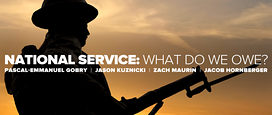A popular expression for being angry is “to see red.” It gets at an important truth, which is that anger causes a sort of partial blindness. When you put on red-colored glasses, you start to miss important details; grey turns into black.
I would advise Jacob Hornberger to take off those glasses, take a deep breath, and read my essays again. Perhaps then he would stop attributing to me views that I cannot be said to hold, and perhaps then his blows would land on me, and not on the air, or on strawmen.
The idea of military service sends Mr. Hornberger into ludicrous fantasies of armed resistance against the state’s jack-booted thugs, as if such a hypothetical would teach anybody anything; as if that is any sort of defensible response to a democratic law deemed unjust. (Don’t get to close to Mr. Hornberger’s house around tax day, you might catch a stray bullet.)
Mr. Hornberger writes that “no doubt” I believe the state has “omnipotent power” to decide the citizen’s obligations, while linking to the essay where I specifically write that the state loses its legitimacy once it infringes on the citizens’ natural rights. He faults me for not explaining the specific terms of these obligations. The reason, as I wrote, is that it is up to each nation to do so for itself. He takes me to endorse unfettered majority rule when I write that the social contract theory I uphold cannot be held as an open-ended writ for it.
Is Mr. Hornberger really serious when he writes that I “see society as a great big bee hive, one in which everyone exists to serve the greater good of the hive”?
He writes “Where Gobry goes wrong is with his assumption that the state, not the individual, is sovereign.” He could have written “Gobry is a 250 pound woman from Montana” and his readers would be equally well informed.
Through Mr. Hornberger’s monochromatic vision, we see that there are only two kinds of people in the world: libertarians and “statists.”
Either the individual is sovereign, or else the state is. If you are not a libertarian, why, you must believe that society is just a “great big bee hive” and that “slavery” to the state is legitimate. No middle ground! No grey areas! All or nothing!
Libertarians “believe in fundamental, God-given, natural rights that preexist government, rights that are immune from the will of the majority.” That’s very good for them, because so do I. (Would it blow Mr. Hornberger’s mind if I told him most quasi-socialists do, too?)
In the end, Mr. Hornberger has written something that I never could: a very convincing reductio ad absurdum of libertarianism. If libertarianism were really this stunted, Manichean worldview, it would have nothing to recommend in itself.
The libertarianism I admire and learn from is the one of Milton Friedman, empirical, nuanced and uplifting; and of F. A. Hayek, whose starting point is the recognition of the inherent complexity of human affairs and limitations of human beings, one that leads not just to rejecting central planning, but to a fundamental epistemic humility. This humility leads to a belief in the justice of limited government, but also to respect for the institutions that have for so long sustained human flourishing, including community and nation.
Of course, that’s what I would say. After all, I’m a conservative. Maybe I’m wrong. But Mr. Hornberger hasn’t convinced me, nor, I suspect, anybody else who wasn’t already convinced.

